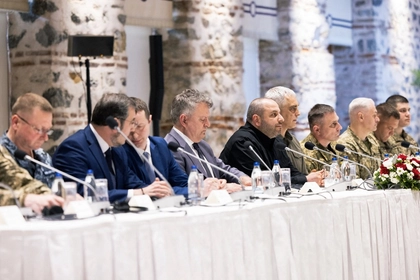Our Terms & Conditions | Our Privacy Policy
EU to Hike 50% Tariff on Russian, Belarusian Agri Imports, Fertilizers
The European Parliament’s International Trade Committee backed a proposal to raise tariffs by 50% on agricultural products from Russia and Belarus, which had previously avoided other EU trade restrictions, including sugar, vinegar, flour, and animal feed, the parliament reported Thursday, May 15.
The EU also plans to impose a 6.5% tariff on fertilizers from the two countries. On top of that, a fixed tariff of €40-45 ($45-50) per tonne will apply during 2025–2026. By 2028, the union is set to increase the duty to €430 ($482) per tonne.
JOIN US ON TELEGRAM
Follow our coverage of the war on the @Kyivpost_official.
The draft regulation was adopted by 29 votes in favor, six against, and two abstentions. The final vote will be during the Parliament’s plenary session in Brussels on Thursday, May 22, the EU Parliament reported.
“This regulation to gradually increase customs duties for products from Russia and Belarus will help to prevent Russia from using the EU market to finance its war machine,” the standing rapporteur for Russia, Inese Vaidere, said.
“It is not acceptable that three years after Russia launched its full-scale war, the EU is still buying critical products in large volumes,” Vaidere added.
According to her, the proposal will give European farmers time to adapt, while boosting local production.
The new tariffs are the latest in a series of sanctions adopted by the European Union over the past decade, attempting to impede Russia’s war in Ukraine.
Other Topics of Interest
Russia-Ukraine Delegations Use Interpreter in Istanbul Talks as Zelensky Warns of ‘Theater’
Delegations spoke via interpreter; Zelensky warns talks are a sham and calls for more sanctions if Russia is not serious.
According to the European Commission, revenues from fertilizer exports help finance Russia’s war in Ukraine.
Fertilizer imports from Russia were already high in 2023. In 2024, they increased further. The Commission says that this economic dependency poses a threat to EU food security and makes the union vulnerable to possible coercive measures by Russia.
The EU expects the measures to cut imports of these goods significantly. They aim to support EU fertilizer producers, who have struggled to compete with cheaper imports.
The regulation also gives the Commission a role in monitoring prices. If market disruptions occur, Brussels will intervene to protect the internal market and EU farmers, the Parliament reported.
Although Russia’s agricultural exports span beyond the European Union, the financial implications of additional tariffs can have pernicious effects on Russia’s already hampered war-time economy too.
Fewer exports can lead to oversaturation in Russia’s domestic markets. However, this could initially benefit domestic consumers. The price depreciation of these exports will inevitably take a toll on producers who benefit from the international business.
Images are for reference only.Images and contents gathered automatic from google or 3rd party sources.All rights on the images and contents are with their legal original owners.



Comments are closed.